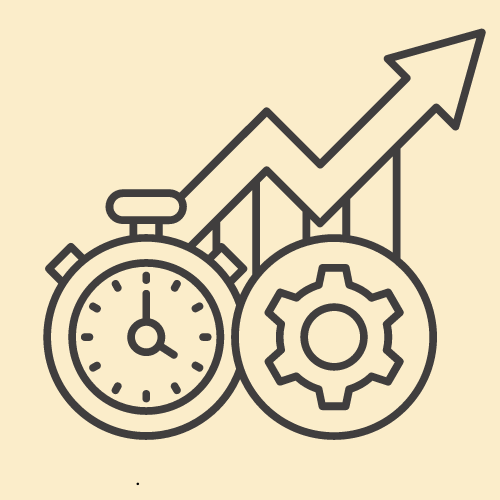7 Proven Strategies for Enhancing Business Efficiency

Success, success, success… everyone yearns for it, but not everyone gets it. It’s always been a journey filled with ups and downs, especially now, when almost 91% of businesses are involved in digital initiatives.
And if you think that luck is the only reason for everyone’s success, you’re deeply mistaken. While some might have been born into wealth, success is the fruit of hard work and efficiency for most. The ability to do more even when you have less.
If you’re ready to work smarter, you’ll find in this article seven proven strategies that can enhance your business efficiency and bring you one step closer to your goal.
Let’s delve into it!
Chapters
- Perché l’efficienza aziendale è importante
- 7 strategie per migliorare l’efficienza aziendale
- 1. Automatizza le attività ripetitive
- 2. Creare un quadro di autovalutazione
- 3. Identificare e affrontare i potenziali rischi
- 4. Sfrutta al massimo gli strumenti dell'help desk
- 5. Imposta obiettivi chiari
- 6. Raccogliere dati per decisioni basate sui dati
- 7. Continua a migliorare
- FAQ
Why business efficiency matters

For the same reason continuous learning mattered when you were a student. You had to learn how to use your time wisely, to juggle between having fun and studying. It’s the same for businesses, maybe a bit more complex, but at its core, it’s about making the most of what you have. Here’s how an efficient business can benefit in the long run:
- Boosted productivity. Avoiding your responsibilities for days only to leave them for the eleventh-hour works in nobody’s favor – not yours, and definitely not your employees’. When you work efficiently, you can spread the work over time, which means less stress for everyone.
- Increased revenue. The idea is to use less capital and time but still increase revenue. For restaurants, this is often done with job rotation, where employees switch between different roles, allowing them to serve more customers in a shorter time. The result is increased revenue.
- Satisfied customers. Nobody likes to wait, but we can all agree on how impatient customers can be. By working more efficiently to provide faster and more reliable service, you might never have to deal with such situations again.
- Competitive advantage. Efficiency and everything it brings to your business ultimately sets it apart. People react the same way to both a quick and reliable business as they would if someone is both pretty and smart – with awe.
Efficiency doesn’t only benefit you as an individual, nor it’s only beneficial for your employees or customers, but it positively impacts all of your business’s aspects. The list can go on and on, but I’d like to go straight to the point – how to improve your business efficiency.
7 strategies to enhance business efficiency
Efficiency is always associated with improving, thriving, succeeding, you know, all those positive outcomes. Now, let’s take a look at a few strategies to make sure you stay on the right track and never take it to an extreme, for example, sacrifice quality.
1. Automate repetitive tasks
Sure, hard work can improve your skills and knowledge. However, repetitive tasks aren’t always the answer. I mean, what’s the point of doing the same thing over and over again when there’s nothing new to learn? It just takes up your valuable time that could be spent on tasks that can promote actual growth.
So, when someone automates tasks doesn’t mean they’re too lazy to do it themselves; it simply means they know how to prioritize tasks. And by doing so, their business never stays at the status quo. Instead, it adapts, grows, and moves forward.
Businesspeople didn’t even have the possibility of automating tasks, but you do. Thanks to technology, especially artificial intelligence, you can invest in software that will automate your business tasks in no time – from sending personalized emails to customers to handling data entry.
2. Create a self-evaluation framework
Creating a self-evaluation framework is a smart way to boost efficiency, even if it’s not for your business goals. But when it is, self evaluation examples include defining clear goals, identifying training needs, and learning from your mistakes.
Think of self-evaluation as self-judgment. You can receive thousands of critiques and compliments but can never really understand the point until you hear it from yourself.
Self-evaluation can help your employees understand their strengths and weaknesses to identify better the areas in which they need improvement. It can improve your personal productivity, as well as the overall performance of your team. Incorporating the best performance management tool can further enhance this process by providing structured feedback and actionable insights for continuous growth.
3. Identify & address potential risks

Nothing comes without a risk. You took a risk when you started your business, and now, you have to make sure that nothing harms it. By timely addressing potential risks, you prevent unexpected disruptions to your business operations. Here’s the complete journey to mitigating risks:
- Identify risks. What kind of risks is your business prone to? Maybe it’s a financial risk, such as changes in customers’ interests or market rises, or maybe it’s an operational risk, like supply chain disruptions. Whatever it is, identifying it beforehand ensures it won’t catch you off guard and disrupt your business efficiency.
- Implement risk strategies. This is how you fight them. You can either create contingency plans or invest in safeguarding solutions, which will warn you if a risk is on its way and fight it if it’s already here; you basically don’t even have to lift a finger.
- Monitor your efforts. You must if you want to take control of risky situations. However, if you decide to invest in a safeguarding solution, then you don’t have to do this on your own. You’ll always be up-to-date about the effectiveness of your efforts.
While often overlooked, risk mitigation plays a huge role when looking to enhance the efficiency of your business. It’s all about creating a more safe and stable environment to prevent potential risks and, ultimately, improve overall efficiency.
4. Make the most of help desk tools
You know how we already mentioned that fast services make customers happy, and happy customers mean a positive reputation. Well, help desk tools are an expert in customer satisfaction. They ensure your support is quick and efficient so that customers’ questions can always be answered on time.
They’re like storage for customer conversations and requests, making sure nothing gets lost or forgotten. These tools even do tasks on their own, like sending quick responses when needed. And what’s best – help desk tools are designed to prioritize tasks – urgent problems get quick responses while routine ones are handled systematically.
5. Set clear goals
Nobody climbs a mountain without a clear goal. So, are you sure you want to climb yours without one? Setting clear goals is understanding what you’re working toward, and by doing so, you can easily prioritize tasks to make sure that they bring you closer to your goal.
When you’re aware of your intentions, you know what to do, where to go, and how to get there. You and your employees won’t be operating blindly; instead, you’ll know exactly how much time is necessary and which resources are needed.
6. Gather data for data-driven decisions
Gathering data in order to make informed decisions is what everyone’s doing nowadays, and you should, too. It’s how you make decisions faster, but only accurate ones that work in your favor, in the favor of your business.
Sometimes, when making a business decision, you’ll find yourself in deep waters, unsure if it’s the right one. Well, rest assured that this won’t happen if these decisions are based on data, on accurate information only. You’ll act quickly and with confidence.
7. Keep getting better
You must continuously improve if you want your business to thrive. Improving efficiency isn’t just a one-time thing; it’s continuously seeking ways to improve and stand out against competitors. And in this digital era, the competition is fierce, so you better learn to adapt to changes.
Everything in life changes, and the business world is no exception. Just imagine how much has changed in the last few years, how much you’ve learned, and how many new ideas you’ve embraced. Imagine how many new businesses have opened and how many have closed. if you want your business to stay relevant and competitive – never stop improving.
The path forward
When you see the big picture, everything revolves around the efficiency of your business. It affects every aspect of your business’s success – revenue, productivity, employers’ and customers’ satisfaction, as well as the competitive advantage.
Improving efficiency isn’t easy, but it’s so much easier now than it was in the past. You now have the tools and knowledge to streamline your operations. A 9 day fortnight can also provide an innovative approach, enabling teams to work more efficiently while maintaining balance, all while making data-driven decisions and mitigating risks. If you’re fully committed, improving your business’s efficiency will come soon enough.
FAQ
What does it mean to enhance business efficiency?
Enhancing business efficiency involves improving processes, systems, and workflows to optimize resource utilization, reduce waste, and achieve organizational goals with greater speed, accuracy, and cost-effectiveness.
Why is enhancing business efficiency important for organizations?
Enhancing business efficiency is important for organizations because it increases productivity, profitability, and competitiveness, enhances customer satisfaction, fosters innovation and growth, and ensures sustainability in a rapidly changing business landscape.
What are some areas within a business that can be targeted for efficiency improvement?
Areas within a business that can be targeted for efficiency improvement include operational processes, supply chain management, inventory control, project management, customer service, sales and marketing, human resources, and financial management.
What are the benefits of enhancing business efficiency?
The benefits of enhancing business efficiency include reduced costs, increased revenue and profitability, improved quality and customer satisfaction, faster time-to-market for products and services, enhanced employee morale and engagement, and better utilization of resources.
What strategies can businesses implement to enhance efficiency in their operations?
Businesses can implement various strategies to enhance efficiency in their operations such as adopting lean principles, automating repetitive tasks, investing in technology and software solutions, streamlining workflows, optimizing supply chain management, and empowering employees through training and development.
How can data analysis and business intelligence tools contribute to enhancing efficiency?
Data analysis and business intelligence tools can contribute to enhancing efficiency by providing insights into key performance metrics, identifying areas for improvement, forecasting demand and trends, optimizing resource allocation, and making data-driven decisions to drive continuous improvement.
What role does employee engagement play in enhancing business efficiency?
Employee engagement plays a critical role in enhancing business efficiency by fostering a culture of accountability, collaboration, and innovation, empowering employees to take ownership of their work, and creating a positive work environment that motivates employees to perform at their best.
How can businesses measure and track their progress in enhancing efficiency?
Businesses can measure and track their progress in enhancing efficiency by establishing key performance indicators (KPIs), setting benchmarks and targets for improvement, conducting regular performance evaluations, soliciting feedback from stakeholders, and adjusting strategies based on results.
What are some common challenges businesses may face when trying to enhance efficiency, and how can they overcome them?
Some common challenges businesses may face when trying to enhance efficiency include resistance to change, lack of alignment between departments, inadequate resources or infrastructure, and competing priorities. They can overcome these challenges by fostering a culture of continuous improvement, promoting collaboration and communication, investing in training and development, and prioritizing initiatives based on strategic goals.
How can outsourcing certain functions or tasks contribute to enhancing business efficiency?
Outsourcing certain functions or tasks can contribute to enhancing business efficiency by allowing organizations to focus on core competencies, accessing specialized expertise and resources, reducing overhead costs, and gaining flexibility to scale operations based on demand fluctuations.
How can process mapping help businesses enhance efficiency?
Process mapping helps businesses enhance efficiency by visually documenting current workflows, identifying bottlenecks and inefficiencies, pinpointing opportunities for improvement, and streamlining processes to eliminate waste and optimize resource allocation.
What role does technology play in enhancing business efficiency?
Technology plays a crucial role in enhancing business efficiency by automating repetitive tasks, digitizing manual processes, enabling real-time data analysis and decision-making, facilitating remote collaboration, and improving communication and workflow management.
How can businesses leverage continuous improvement methodologies to enhance efficiency?
Businesses can leverage continuous improvement methodologies such as Six Sigma, Kaizen, and Lean Management to systematically identify, analyze, and eliminate inefficiencies, standardize processes, and drive ongoing improvements in quality, productivity, and customer satisfaction.
What are some key performance indicators (KPIs) that businesses can use to measure efficiency?
Key performance indicators (KPIs) that businesses can use to measure efficiency include metrics such as cycle time, throughput, error rates, resource utilization, customer satisfaction scores, employee productivity, and return on investment (ROI) for process improvement initiatives.
How can businesses optimize their supply chain to enhance efficiency?
Businesses can optimize their supply chain to enhance efficiency by improving demand forecasting accuracy, reducing lead times and inventory holding costs, implementing just-in-time (JIT) inventory management practices, and fostering collaboration with suppliers and logistics partners.
What are some strategies for improving communication and collaboration within a business to enhance efficiency?
Strategies for improving communication and collaboration within a business to enhance efficiency include implementing project management tools, establishing clear communication channels and protocols, fostering a culture of transparency and accountability, and promoting cross-functional teamwork.
How can businesses reduce paperwork and administrative burden to enhance efficiency?
Businesses can reduce paperwork and administrative burden to enhance efficiency by digitizing documentation processes, implementing electronic signature solutions, centralizing data storage and retrieval systems, and streamlining approval workflows through automated systems.
What role does leadership support and buy-in play in driving efficiency improvements within an organization?
Leadership support and buy-in are critical in driving efficiency improvements within an organization by setting clear goals and priorities, allocating resources effectively, empowering employees to make decisions and take ownership of process improvements, and leading by example through continuous learning and improvement.
How can businesses encourage innovation and creativity to drive efficiency gains?
Businesses can encourage innovation and creativity to drive efficiency gains by fostering a culture of experimentation and risk-taking, recognizing and rewarding innovative ideas and initiatives, providing opportunities for professional development and cross-functional collaboration, and embracing new technologies and methodologies.
What are the long-term benefits of investing in business efficiency improvements?
The long-term benefits of investing in business efficiency improvements include increased profitability and competitiveness, enhanced resilience to market disruptions, improved customer satisfaction and loyalty, greater agility and adaptability to changing business environments, and sustainable growth and success over time.
Author bio
 Makedonka Micajkova is a freelance content writer and translator, always bringing creativity and originality to the table. Being multilingual with professional proficiency in English, German, and Spanish, it’s needless to say that languages are her biggest passion in life. She is also a skilled communicator, as a result of having three years of experience as a sales representative. You can find her on Linkedin.
Makedonka Micajkova is a freelance content writer and translator, always bringing creativity and originality to the table. Being multilingual with professional proficiency in English, German, and Spanish, it’s needless to say that languages are her biggest passion in life. She is also a skilled communicator, as a result of having three years of experience as a sales representative. You can find her on Linkedin.
Master the Art of Video Marketing
AI-Powered Tools to Ideate, Optimize, and Amplify!
- Spark Creativity: Unleash the most effective video ideas, scripts, and engaging hooks with our AI Generators.
- Optimize Instantly: Elevate your YouTube presence by optimizing video Titles, Descriptions, and Tags in seconds.
- Amplify Your Reach: Effortlessly craft social media, email, and ad copy to maximize your video’s impact.